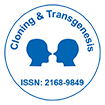
Cloning & Transgenesis
Open Access
ISSN: 2168-9849

ISSN: 2168-9849
Ahmed M Malki and Hassan A Aziz
Lung cancer accounts for about 27% of all cancer deaths and considered as the leading cause of cancer-associated death worldwide. Genotype-driven therapeutics is a standard of care for majority of subgroup of NSCLC patients with admetastatic disease. Recently, targeting NSCLC harboring anaplastic lymphoma kinase (ALK) fusions and ROS1 fusions have produced similar results in terms of overall response rate (ORR). Based on the fact that EGFR and ALK mutations are mutually exclusive, to the patients who carry ALK rearrangements are currently treated with an ALK inhibitor (crizotinib or ceritinib. BRAF targeting Tyrosine Kinase Inhibitors TKIs (dabrafenib, vemurafenib) are approved for BRAF mutated malignant melanoma and currently in phase III trials, the classical V600E mutation are most common and they occur within exons 11 and 15. BRAF V600E mutations are associated with light/never smoker status, while non- V600E mutations are more frequent in former or current smokers and are associated with poorer outcome. Clinical data revealed that BRAF activating mutations may predict sensitivity to inhibition of MEK which is confirmed by clinical response seen with MEK TKIs in BRAF mutated melanoma. Additionally, synergistic activity for the combination of BRAF- and MEK-inhibition has been demonstrated in another preclinical model. Many current trials in BRAF mutated lung adenocarcinoma investigate BRAF-, MEK- and AKT-inhibitors.